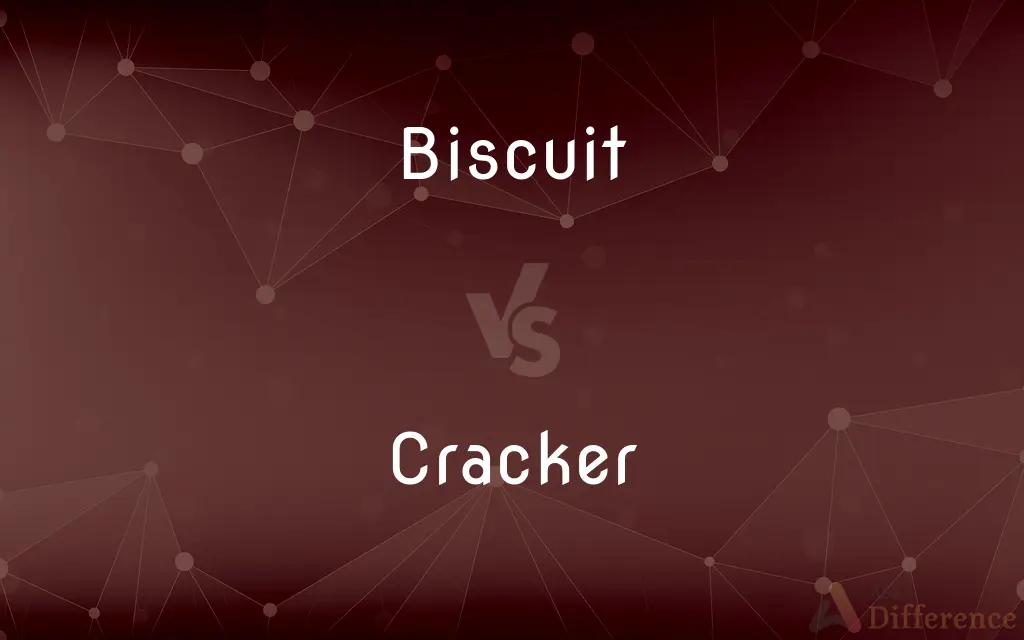Biscuit vs. Cracker — What's the Difference?
By Maham Liaqat & Fiza Rafique — Updated on March 12, 2024
Biscuits are often sweet, soft, and flaky, ideal for snacks or breakfast, while crackers are savory, crisp, and perfect for pairing with cheese or dips.

Difference Between Biscuit and Cracker
Table of Contents
ADVERTISEMENT
Key Differences
Biscuits, in American English, refer to a variety of soft, leavened bread, typically round, flaky, and buttery. Crackers, on the other hand, are thin, crispy, and usually savory snacks made from flour, water, and, often, fat.
While biscuits are typically served warm and fresh from the oven as part of a meal or as a standalone snack, crackers are shelf-stable and convenient for on-the-go snacking or entertaining. Biscuits are often seen as comfort food, embodying a homemade, hearty quality, whereas crackers are appreciated for their versatility and ability to complement a wide range of toppings.
The preparation methods also differ significantly; biscuit dough is gently mixed and folded to create layers, then cut into shapes before baking, ensuring a tender, flaky texture. Cracker dough, however, is rolled thin and pricked to prevent puffing during baking, resulting in a crisp finish.
Culturally, biscuits hold a special place in American cuisine, particularly in the South, where they're a key component of traditional meals. Crackers have a broader utility, serving as a staple in various food cultures for their convenience and adaptability, used in everything from simple snacks to elaborate appetizers.
Comparison Chart
Texture
Soft, flaky, and tender.
Crisp and crunchy.
ADVERTISEMENT
Flavor
Often slightly sweet, buttery.
Usually savory, can range from plain to flavored.
Serving Suggestion
Warm with butter, jam, or gravy.
With cheese, meats, or spreads.
Preparation
Mixed gently to create layers, baked to be tender.
Rolled thin, pricked, baked to be crisp.
Role in Cuisine
Breakfast or snack, comfort food.
Snack, appetizer complement, versatile topping carrier.
Compare with Definitions
Biscuit
A soft, flaky bread usually made with flour, butter, and milk.
She enjoyed a warm biscuit with her morning coffee.
Cracker
A thin, crispy snack made from flour, water, and sometimes fat.
She packed a handful of crackers for her lunch.
Biscuit
Often served as a breakfast item or snack, sometimes sweetened.
Homemade biscuits with honey are a family favorite.
Cracker
Designed to be crisp and shelf-stable.
The crispness of the crackers made them a perfect snack.
Biscuit
Typically baked and served fresh.
Freshly baked biscuits filled the kitchen with a comforting aroma.
Cracker
Comes in various flavors and textures, from salty to multi-grain.
Multi-grain crackers offer a healthy snacking option.
Biscuit
Characterized by its tender, layered texture.
The secret to her tender biscuits was cold butter.
Cracker
Savory and often seasoned, ideal for pairing with toppings.
Cheese and crackers are a classic party appetizer.
Biscuit
Can vary in ingredients, including buttermilk for tanginess.
Buttermilk biscuits are a staple in southern cooking.
Cracker
Used in a wide range of culinary applications.
Crackers crumbled atop a casserole add a crunchy texture.
Biscuit
A biscuit is a flour-based baked food product. In most countries, particularly in the Commonwealth and Ireland, biscuits are typically hard, flat and unleavened.
Cracker
A person or thing that cracks.
Biscuit
A small baked unleavened cake, typically crisp, flat, and sweet
A chocolate biscuit
Cracker
A decorated paper cylinder which, when pulled apart, makes a sharp noise and releases a small toy or other novelty
A Christmas cracker
Biscuit
Porcelain or other pottery which has been fired but not glazed
Biscuit ware
Cracker
A thin dry biscuit, typically eaten with cheese
The sausage is delicious on hot toast or crackers
Biscuit
A light brown colour.
Cracker
A fine example of something
Don't miss this cracker of a CD
Biscuit
A small flat piece of wood used to join two larger pieces of wood together, fitting into slots in each.
Cracker
Another term for poor white
Biscuit
A small cake of shortened bread leavened with baking powder or soda.
Cracker
A thin crisp wafer or biscuit, usually made of unsweetened dough.
Biscuit
A thin, crisp cracker.
Cracker
A firecracker.
Biscuit
A cookie.
Cracker
A small cardboard cylinder covered with decorative paper that holds candy or a party favor and pops when a paper strip is pulled at one or both ends and torn.
Biscuit
A hard, dry cracker given to dogs as a treat or dietary supplement.
Cracker
The apparatus used in the cracking of petroleum.
Biscuit
A thin, often oblong, waferlike piece of wood, glued into slots to connect larger pieces of wood in a joint.
Cracker
One who gains unauthorized access to a computer or computer network, usually for a malicious purpose such as to steal information or damage programs. See Usage Note at hacker.
Biscuit
A pale brown.
Cracker
(Offensive) Used as a disparaging term for a white person, especially one who is poor and from the southeast United States.
Biscuit
Pl. biscuit Clay that has been fired once but not glazed. Also called bisque2.
Cracker
A dry, thin, crispy baked bread (usually salty or savoury, but sometimes sweet, as in the case of graham crackers and animal crackers).
Biscuit
A small, flat, baked good which is either hard and crisp or else soft but firm; a cookie.
Cracker
A short piece of twisted string tied to the end of a whip that creates the distinctive sound when the whip is thrown or cracked.
Biscuit
A small, usually soft and flaky bread, generally made with baking soda, which is similar in texture to a scone but which is usually not sweet.
Cracker
A firecracker.
Biscuit
A cracker.
Cheese and biscuits
Water biscuits
Digestive biscuits
Cracker
A person or thing that cracks, or that cracks a thing (e.g. whip cracker; nutcracker).
Biscuit
(nautical) The "bread" formerly supplied to naval ships, which was made with very little water, kneaded into flat cakes, and slowly baked, and which often became infested with weevils.
Cracker
The final section of certain whips, which is made of a short, thin piece of unravelled rope and produces a cracking sound.
Biscuit
A form of unglazed earthenware.
Cracker
A Christmas cracker.
Biscuit
A light brown colour.
Cracker
Refinery equipment used to pyrolyse organic feedstocks. If catalyst is used to aid pyrolysis it is informally called a cat-cracker
Biscuit
(woodworking) A thin oval wafer of wood or other material inserted into mating slots on pieces of material to be joined to provide gluing surface and strength in shear.
Cracker
A fine, great thing or person (crackerjack).
She's an absolute cracker!
The show was a cracker!
A cracker of a day.
Biscuit
A plastic card bearing the codes for authorizing a nuclear attack.
Cracker
An ambitious or hard-working person (i.e. someone who arises at the 'crack' of dawn).
Biscuit
A handgun, especially a revolver.
Cracker
(computing) One who cracks (i.e. overcomes) computer software or security restrictions.
Script kiddie
Biscuit
A puck (hockey puck).
Cracker
(obsolete) A noisy boaster; a swaggering fellow.
Biscuit
(slang) The head.
Cracker
An impoverished white person from the southeastern United States, originally associated with Georgia and parts of Florida; (by extension) any white person.
Biscuit
A kind of unraised bread, of many varieties, plain, sweet, or fancy, formed into flat cakes, and bakes hard; as, ship biscuit.
According to military practice, the bread or biscuit of the Romans was twice prepared in the oven.
Cracker
A police officer.
Biscuit
A small loaf or cake of bread, raised and shortened, or made light with soda or baking powder. Usually a number are baked in the same pan, forming a sheet or card.
Cracker
A northern pintail, species of dabbling duck.
Biscuit
Earthen ware or porcelain which has undergone the first baking, before it is subjected to the glazing.
Cracker
(obsolete) A pair of fluted rolls for grinding caoutchouc.
Biscuit
A species of white, unglazed porcelain, in which vases, figures, and groups are formed in miniature.
Cracker
One who, or that which, cracks.
Biscuit
Small round bread leavened with baking-powder or soda
Cracker
A noisy boaster; a swaggering fellow.
What cracker is this same that deafs our ears?
Biscuit
Any of various small flat sweet cakes (`biscuit' is the British term)
Cracker
A small firework, consisting of a little powder inclosed in a thick paper cylinder with a fuse, and exploding with a sharp noise; - usually called firecracker.
Cracker
A thin, dry biscuit, often hard or crisp; as, a Boston cracker; a Graham cracker; a soda cracker; an oyster cracker.
Cracker
A nickname to designate a poor white in some parts of the Southern United States.
Cracker
The pintail duck.
Cracker
A pair of fluted rolls for grinding caoutchouc.
Cracker
A thin crisp wafer made or flour and water with or without leavening and shortening; unsweetened or semisweet
Cracker
A poor white person in the southern United States
Cracker
A programmer who `cracks' (gains unauthorized access to) computers, typically to do malicious things;
Crackers are often mistakenly called hackers
Cracker
Firework consisting of a small explosive charge and fuse in a heavy paper casing
Cracker
A party favor consisting of a paper roll (usually containing candy or a small favor) that pops when pulled at both ends
Common Curiosities
What makes biscuits different from crackers in terms of texture?
Biscuits are soft, flaky, and tender, whereas crackers are known for their crisp and crunchy texture.
What is the primary use of biscuits in meals?
Biscuits are often served as part of breakfast or as a snack, commonly accompanied by butter, jam, or gravy.
What is the key to achieving the perfect texture in biscuits and crackers?
For biscuits, the key is gentle mixing and baking just until done to keep them tender. For crackers, rolling the dough thin and baking until crisp ensures the right texture.
How do cultural perceptions of biscuits and crackers differ?
Biscuits are often seen as a comfort food, particularly in American cuisine, while crackers are valued for their convenience and versatility globally.
How can one add flavor to biscuits and crackers?
Flavor can be added to biscuits with ingredients like cheese or herbs and to crackers through seasonings and the type of flour used.
Can biscuits be savory and crackers sweet?
While biscuits are typically slightly sweet or neutral, savory versions exist. Similarly, there are sweet-flavored crackers.
Are biscuits and crackers interchangeable in recipes?
Due to their differing textures and flavors, biscuits and crackers are not generally interchangeable in recipes.
How do crackers complement other foods?
Crackers serve as a versatile base for cheeses, meats, and spreads, enhancing appetizers and snacks with their crunchy texture.
Why are crackers pricked before baking?
Crackers are pricked to prevent puffing during baking, ensuring they stay flat and crisp.
Can dietary restrictions be accommodated with biscuits and crackers?
Yes, there are gluten-free, vegan, and low-calorie versions of both biscuits and crackers to accommodate various dietary needs.
What role does fat play in the texture of biscuits and crackers?
Fat contributes to the tender crumb of biscuits and the crispiness of crackers, influencing their texture and flavor.
How do storage requirements differ for biscuits and crackers?
Biscuits are best enjoyed fresh but can be stored for a few days, while crackers, being shelf-stable, last much longer.
How has the popularity of biscuits and crackers evolved?
Both have remained popular, with trends favoring artisanal and flavored varieties, reflecting broader culinary interests and health considerations.
What are common mistakes when making biscuits?
Overmixing the dough and not using cold butter can result in tough biscuits.
Is it difficult to make homemade biscuits and crackers?
With basic baking skills, both biscuits and crackers can be made at home, allowing for customization of flavors and ingredients.
Share Your Discovery

Previous Comparison
Advice vs. Advise
Next Comparison
Spatial vs. TemporalAuthor Spotlight
Written by
Maham LiaqatCo-written by
Fiza RafiqueFiza Rafique is a skilled content writer at AskDifference.com, where she meticulously refines and enhances written pieces. Drawing from her vast editorial expertise, Fiza ensures clarity, accuracy, and precision in every article. Passionate about language, she continually seeks to elevate the quality of content for readers worldwide.
















































